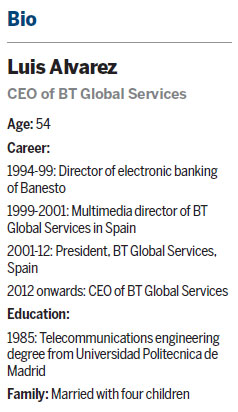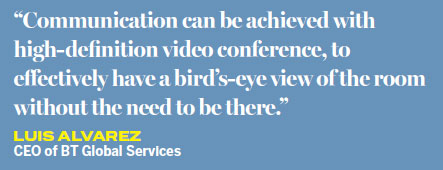How to think global, act local in China
Updated: 2016-01-22 08:40
By Cecily Liu(China Daily Europe)
|
|||||||||||
|
|
Head of BT Global, a network IT firm, says it takes balance and a strong staff with on-the-ground expertise and a worldwide vision
When Luis Alvarez took the helm at BT Global Services in 2012, he was the fourth CEO in four years at the loss-making division of the United Kingdom telecommunications operator BT Group.
He has since turned the unit around and it accounts for 38 percent of BT's overall revenue, according to the latest figures available.
Alvarez says that central to his success has been localization and connectivity - that is, bringing localized services to multinational clients through global connectivity.
"For example, if a Chinese company was designing clothes for Spain or Italy in the old days, the employees would fly between China and Europe. But now, communication can be achieved with high-definition video conference, to effectively have a bird's-eye view of the room without the need to be there," he said.
The company's initial China strategy was to mainly service its multinational clients that had established a presence there, but this changed in recent years as its client base increasingly consisted of Chinese firms with an eye to expand globally. His China staff has grown from a handful of employees in 1995 to more than 300 today, who work across offices in Beijing, Shanghai, Shenzhen and Dalian.

Alvarez spoke to China Daily recently about his business plan in China, management style and personal life. The following are edited excerpts.
Q: What are your business strategies in adjusting to China's latest economic developments, like the "new normal" and Belt and Road Initiative?
A: BT's goal is to provide a better world through the power of communication. We provide connectivity in both voice and data to support our customers to grow their business globally. Due to the regulatory constraints in China, we need to expand more partnerships to reach out to more customers in order to deliver our capabilities. Besides our partnership with China Telecom Corp and China United Network Communications Group Co, we recently signed a partnership agreement with GNET to bring our conferencing solutions into China.
China's Belt and Road Initiative focuses on connectivity and cooperation among countries, primarily in Eurasia. We have been servicing and connecting Europe and Asia, including China, since BT established its presence in China two decades ago. With the Belt and Road, I believe there will be more business activities between Europe and Asia, which will provide us more business opportunities.
Q: How would you comment on the prospects of your company in China in the context of the current economic situation there?
A: Although China's economy has been slowing, we are still optimistic about the prospects in the country. Thanks to the continued investments in China by global multinationals and Chinese companies' aggressive expansion overseas, BT still records strong growth in the China market. Of course, we still hope the regulatory constraints for telecom and related value-added services in China will continue to relax. If this happened, it would certainly attract even more foreign investment into China. And BT would be able to bring a wider range of portfolio and value propositions to the Chinese customers that we are already providing to the customers around the world.
Q: In your view, what is the secret of your business' success in China?
A: As a leading global networked IT service provider, BT has a strong capability to think global and act local with our customers. As our customers are growing globally, they need a global standard for better management and planning. At the same time, they also need speed and capability to execute locally. Backed by our strong global infrastructure and portfolio of solutions, we at the same time tap into local resources and have strong local managers who have deep knowledge and experience to run the business in China.
Q: What essential leadership qualities do you consider important when leading your staff to grow in the Chinese market?
A: We need strong local talent with overseas exposure. We look for leaders who understand the local market and culture well but also have a global vision.
Q: How do you motivate your international staff?
A: We educate our international staff about China market trends and demands as well as BT's value propositions and differentiators over our global and local competition. We are confident that BT is very competitively positioned in both the China and global markets. We will continue to grow our business to provide more development opportunities for our international team.
Q: How do you handle challenges your team has encountered in China, if any?
A: We handle challenges through change. We change according to external market environment, customer needs and wants. We believe in survival of the fittest and we constantly adapt to external changes to be the best. We have an open and collaborative working culture in BT where teams work together and help each other to overcome challenges
Q: What do you think about the Chinese Dream? What are the dreams you have for your company in China?
A: For BT, our dream is that the Chinese government will continue to liberalize and the China market will be more open. This will certainly be conducive to more foreign investment and ultimately benefit people in China.
Q: What are your hobbies? How do you spend your time outside of work when you are in China?
A: I really like reading, and I like to keep updated on what is happening in the technology world. I go to the gym and I run - I think you should be fit mentally and physically. And when I am at home, I am learning to play the piano, and I am even spending some time building doll's houses. In China, I love trying different types of Chinese food, and I love to walk around and see all the vibrant activities and markets, which I think is fascinating.
Q: What is your life and business philosophy?
A: I think that you have to work with a purpose, and feel that you are really making a contribution, that you have achieved something for your customers, your people, or the society. I like to feel that - that's my business philosophy. And actually I also think there's one life - there aren't moments of "work" and moments of "life" that are contradictory. You just have one sequence of minutes to live, and you need to decide how to spend each second to make it the best it can be.
Q: What is the book you are reading now? What is your favorite book?
A: Normally I'm reading more than one book at any time. One of them at the moment is Speed Lead by Kevan Hall. Another one is a Spanish book called The Emperor's Assassins, by Santiago Posteguillo Gomez. I'm also reading Conversations with Myself by Nelson Mandela. In terms of my favorite books, I have two - probably one of the books I like the most is Twenty Love Poems and a Song of Despair by Pablo Neruda. The other one is Aunt Julia and the Scriptwriter by Mario Vargas Llosa.
Q: What kind of "green" lifestyle do you have?
A: I am very careful with how I use electricity, and also do small things such as not using plastic bags in supermarkets. I like to walk or cycle to work as well instead of taking public transport or a car.
Q: Name places in China that impressed you most or that you have not been to but want to explore. What was your favorite trip?
A: Three places have impressed me the most: First, the Terracotta Warriors in Xi'an. Second, of course, the Great Wall. But my favorite trip in China was probably to see Guilin (Guangxi Zhuang autonomous region) and Lijiang (Yunnan province). I would really like to go to Dalian (Liaoning province), because we have a lot of people working there for BT, and I've been told it's a beautiful place to visit - very culturally diverse, and some beautiful bays. And I would also like to see the surroundings of the Tibet region.
Q: How do you spend your weekend?
A: I do a bit of work, reading the documents I didn't have time to read properly during the week. I read, I watch films, I go for a run - and I spend a lot of time with my family.
cecily.liu@chinadaily.com.cn

Today's Top News
Global push
AIIB chief vows to run clean, lean, green institution
'More Europe' to deal with 'triple crisis'
China gives beleaguered Tsipras a helping hand
China injects note of confidence in Davos
China and Gulf nations resume free trade talks
IMF starts to select new chief
Merkel insists on European solution for refugee crisis
Hot Topics
Lunar probe , China growth forecasts, Emission rules get tougher, China seen through 'colored lens', International board,
Editor's Picks

|

|

|

|

|

|







